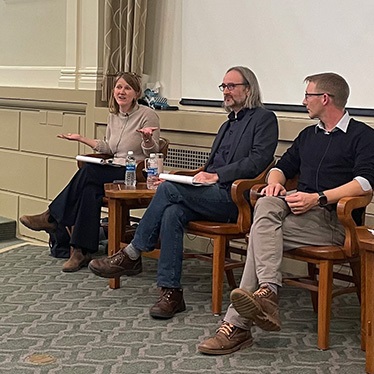Big Data and PA Careers
August 6, 2019
A new specialization within the MPA prepares students for the challenges and benefits of lots of data.
In Boston, the public works department receives real-time data, via citizen smartphones, each time someone with the app reports a pothole. Aggregate such data from thousands of phones and you can assemble a detailed picture of current pothole problems. This has an almost futuristic, gee-whiz appeal. But it’s not the future. It’s now.

“There’s been an explosion in the quantity and forms of data available to support organizational decision making,” says Bob Bifulco, chair of public administration and international affairs (PAIA). Traffic monitoring, police video, smart meters — the list goes on and on. “It’s a mass of data,” he says, “available in an electronic, processable form.”
Everywhere, Big Data presents challenges: how to manage the volume, give it shape and meaning, and prioritize among its many possible conclusions. But in the public and nonprofit sectors, the data deluge raises issues of equity, privacy, and transparency.
Back in Boston, for example, how do we know that smartphones and app users — and thus pothole repairs — are evenly distributed? Might it be prudent and ethical to fix more potholes in neighborhoods where residents can least afford to fix their cars? If data is public, and you are a public manager, who’s out there judging your responsiveness? And potholes are mundane; there are more profound issues. For example, are we comfortable letting a computer algorithm predict the likely recidivism of a criminal defendant?
Maxwell this year introduced, within the MPA, an elective study track in data analytics, with the hope of soon building it into a stand-alone certificate. It is meant to provide expertise in extracting, storing, and managing data; an understanding of ways in which data can inform government and nonprofit decision making; and a deeper appreciation of the political/ethical environment that complicates data use.
Two courses in the track are focused on informed, astute policy analysis in all its forms, with data analysis an important component. The courses, taught by senior PAIA professors Pete Wilcoxen and Colleen Heflin, define how data helps a policy professional achieve impact and cost-effectiveness — an end that Maxwell’s MPA has always included.
The other two courses are new, and approach data head-on. Data-Driven Decision Making, taught by Matt Young, mixes skills education (e.g., a project about public housing maintenance based on real New York City data) with a deep dive on efficacy and ethical questions. Young orients students to the dangers of over-trusting data approaches to problems, and the responsibility to think hard about how data is collected and interpreted, so as not to introduce bias and inaccuracies.
Public Sector Predictive Analytics will be taught by Len Lopoo, beginning in fall 2020. It’s an exploration of using machine learning to forecast public needs — “taking data and predicting an outcome,” Lopoo explains. For example, can we predict water main breaks based on past patterns, and prepare for them? A course about Big Data and ethics is planned for later.
Creation of the data analytics track dovetails with another innovation in PAIA meant to match workplace expectations. The School is introducing a variation on its standard one-year MPA — a sequencing that allows for summer internships and fall graduation. This “18-month MPA” is an option, says Bifulco, “for students who lack a lot of workplace experience, or who are effecting a career change, or preparing for certain jobs where internship experience represents an entry point.” It’s especially applicable to the data analytics track, which is intense and best finished with Lopoo’s class during the fall semester. Capstone projects, ordinarily done in May, also move to the fall for these students.
According to Young, public-sector and nonprofit employers expect most hires to have these skills. Their organizations are lean and they don’t have the luxury of slotting one specialized employee into the “data analysis” job. And so it’s not surprising that prospective students have begun to ask for data analytics. “Soon,” says Lopoo, “nearly everyone will say I can’t function in the world of public affairs if I don’t have some of these skills.”
Today, this might feel like a firehose problem. “We have developed technology to produce data about the world,” says Young, “at a much more rapid pace than we have developed the training to help practitioners make sense of it and use it well.”
But for organizations challenged to prove their efficiencies and efficacy, data presents opportunity. “Data will reveal things that the human eye can’t see,” Lopoo says. “In 25 years, people will look back at the sort of information we were basing decisions on and think no wonder we were so inefficient. We’re really moving into a new way of thinking and operating.”
By Dana Cooke
This article appeared in the Spring 2019 print edition of Maxwell Perspective © Maxwell School of Syracuse University. To request a copy, email maxwellperspective@syr.edu.
Related News
School News

Apr 2, 2025
School News

Mar 26, 2025
School News

Mar 24, 2025
School News

Mar 18, 2025